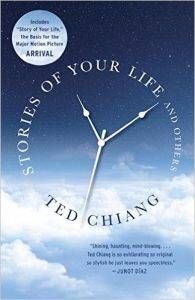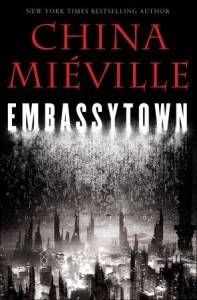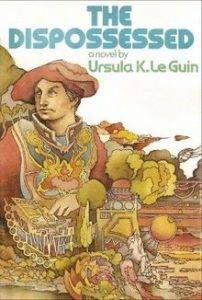
Books to Read If You Loved ARRIVAL or Great Science Fiction Books on Language
One of my favourite films to come out last year was Arrival. It had arresting visuals, a strangely disconcerting, even overwhelming, score and nuanced performances. All this was underpinned by a cerebral and thought-provoking story – something that is so often missing from blockbuster science fiction.
It was particularly pleasing for me, as a lecturer in linguistics, that the main character was a linguistics professor. Academics are more usually portrayed, as with so many other ‘experts’ and ‘scientists’, as the nerdy sidekick, or, worse still, relegated to an expository device: ‘this must happen because SCIENCE!’ I’m being slightly facetious – the debates surrounding diversity and representation in fiction are important – but it was nice to see some variation away from the stereotypical hero. (Author’s note: Don’t get me wrong, there’s definitely a place in my heart for brash, explosion and action heavy sci-fi, but sometimes you crave a little more Upstream Colour and a little less Upstream Colour.)
Without revealing too much, the aforementioned Linguistics professor is brought in by the military to try and communicate with a newly arrived race of aliens hovering above the world. Cue internal frictions, global suspicion and even discussion of the Sapir-Whorf Hypothesis: that our language shapes how we think, that language determines thought. I told you this wasn’t your normal blockbuster!
The availability of language as a tool for shaping how we think crops up a lot in fiction, most famously in Orwell’s 1984 and newspeak: if ‘free choice’ and ‘free will’ no longer exist in language, will it restrict people’s ability to conceive of them?
If you loved Arrival as much as I did, then here a few books ideas that you will love too. These are exciting, cerebral science fiction stories that explore language and how we communicate – something at the heart of all great fiction.
 Story of Your Life by Ted Chiang
Story of Your Life by Ted Chiang
As a first port of call, you should really check out the short story that was adapted into Arrival. To surprisingly little fanfare, perhaps due to his low output, Ted Chiang has quietly been making a name for himself as one of the leading science fiction writers of his generation. He’s won practically every major sci-fi award going and for good reason. Story of Your Life, like much of his work, explores a big idea or concept which is anchored in human experience and relationships. His stories are short but perfectly formed, insightful and lucid, and grasp at the boundaries of human knowledge. Story of Your Life is a great place to start.
 Embassytown by China Miéville
Embassytown by China Miéville
This is Miéville’s most explicitly ‘sci-fi’ novel, featuring space, aliens and biotechnology. The action takes place in Embassytown, a distant colony outpost where humans coexist with the native inhabitants, the Arieki. Communication between the races is difficult on two fronts. Firstly, the Arieki speak by simultaneously producing two word, and only genetically-modified human twins are able to mirror this form of articulation. More problematic is the fact that for the Arieki language is both the expression of thought and the portrayal of reality. These two elements cannot be divided. When they say anything, it must accurately reflect reality, which precludes lying, speculation and any figurative thought.
I love this book. I’m focussing on the linguistic element, but there is so much more to it. If I’m not persuading you, then you should listen to Ursula K. Le Guin: Embassytown ‘works on every level… providing compulsive narrative, splendid intellectual rigour and risk, moral sophistication, fine verbal fireworks and sideshows’.
 The Dispossessed by Ursula K. Le Guin
The Dispossessed by Ursula K. Le Guin
Talking of Le Guin… ideas and concepts from linguistics pervade her work. From etymology (The Left Hand of Darkness) to therolinguistics (animal language, The Author of the Acacia Seeds), tactile language (The Word for World is Forest) and kinesics (Mazes). Her interest in linguistics feeds into wider considerations of culture, anthropology, politics, gender… the list goes on. Le Guin’s writing is compelling. hile her thought experiments are integral, they do not dominate to the detriment of the worlds and characters she creates nor the narrative that drives them.
The Dispossessed, part of her Hainish Cycle, is the ideal choice if you want a further exploration of the Sapir-Whorf hypothesis. In it, the Odonians invent a new language to embody the anarchic ideals of their culture. For example, their dislike of personal property is expressed through the avoidance of possessive pronouns (my, his, hers). Enjoy!


